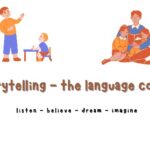Storytelling is one of the most ancient and powerful tools for nurturing a child’s development. From the earliest stages of life, children are captivated by stories—whether they’re listening to parents read aloud, making up their own tales, or interacting with others through spoken word. Beyond its entertainment value, storytelling plays a crucial role in enhancing language development, stimulating imagination, and fostering cognitive and emotional growth. In this article, we’ll explore how storytelling influences a child’s language skills and creative thinking and provide strategies for parents and caregivers to harness its benefits.
The Connection Between Storytelling and Language Development
Language development is a key part of childhood growth, and storytelling provides a rich environment for children to develop and expand their linguistic abilities. Here are some ways storytelling contributes to language skills:
Vocabulary Expansion
- Rich Vocabulary: Through storytelling, children are introduced to new words and phrases. Hearing a variety of vocabulary in different contexts allows them to absorb and use these words in their own speech. For example, listening to a story about a forest adventure can introduce words like “bark,” “canopy,” “squirrel,” and “meadow” that might not come up in everyday conversations.
- Contextual Learning: When children hear new words in a meaningful context (such as in a story), they are more likely to understand their meanings and remember them.
